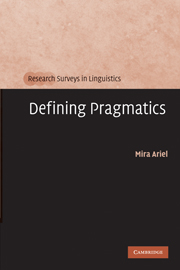Book contents
- Frontmatter
- Contents
- Preface
- Acknowledgments
- Transcription conventions
- 1 What's under the big-tent pragmatics?
- Part I Deconstructing pragmatics
- Part II Reconstituting pragmatics
- Part III Mapping the big tent
- 6 The canon
- 7 Functional syntax
- 8 Beyond pragmatics
- 9 Many questions, some resolutions
- Notes
- References
- Index of names
- Index of subjects
6 - The canon
Published online by Cambridge University Press: 05 June 2012
- Frontmatter
- Contents
- Preface
- Acknowledgments
- Transcription conventions
- 1 What's under the big-tent pragmatics?
- Part I Deconstructing pragmatics
- Part II Reconstituting pragmatics
- Part III Mapping the big tent
- 6 The canon
- 7 Functional syntax
- 8 Beyond pragmatics
- 9 Many questions, some resolutions
- Notes
- References
- Index of names
- Index of subjects
Summary
This chapter is devoted to mapping canonical pragmatic phenomena according to a code/inference division of labor. It is organized mostly around the classical topics of pragmatics following the list of topics mentioned in 4.1: deixis and reference (6.1), speech acts (6.2), meaning determination (6.3), presupposition (6.4), intonation (6.5), discourse structure and topicality (6.6), and Gricean implicatures (6.7). Our goal is to show that it is not possible to predict a priori whether some interpretation/use, or more often, some aspect of an interpretation/use is grammatical or pragmatic.
Deixis and reference
Reference in general, and deixis in particular, have been considered classical pragmatic phenomena (following Bar-Hillel, 1970). The interpretation of deictic expressions, said to be accompanied by pointing, certainly require context-induced inferences regarding salient world objects. Nonetheless, 6.1 demonstrates that successful referential acts must combine encoded with inferred aspects. Since this is the case, reference must include grammatical, and not just pragmatic, aspects.
Referring expressions often encode two types of information simultaneously: conceptual information and procedural information (Ariel, 1988, 1990 and onwards). When Pamela says I (e.g., in I: 2.c), Darryl (her conversational partner) knows that I must refer to the speaker. This is the conceptual content of the code I. Similarly here and tomorrow provide some conceptual coded interpretations (‘proximity to the speaker’ and ‘the next day,’ respectively). Many referring expressions combine conceptual information as above with instructions on how to retrieve the representation of the intended referent from context. These instructions are encoded interpretative procedures.
- Type
- Chapter
- Information
- Defining Pragmatics , pp. 149 - 168Publisher: Cambridge University PressPrint publication year: 2010

